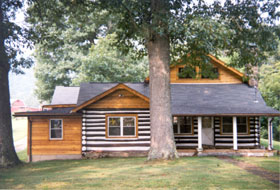Ferrell Family History
adapted from HISTORY OF FOREST HILL COMMUNITY
by George Cottle, Sr.
[ About the Author: George E. Cottle
was a farmer and school teacher. He was born in 1881 and died in 1935. ]
James Ferrell was one of the earliest settlers in this
region. He was born near Forest Hill, Monroe County, in 1807. At the age of his majority he removed to Coal River,
but he returned and determined to seek his permanent residence near Lowell, and hired himself to an old Dutch settler
by the name of Conrad Keller, who had settled near the present village of Lowell. After working for Keller for
some time, James Ferrell married his daughter, Elizabeth, in August 1831. Soon after their marriage they settled
on what is known as the old James Ferrell farm on the Greenbrier River, back of the Big Bend Tunnel. Here, James
Ferrell began life in the woods, the farm being bought by Conrad Keller and given to his daughter, Elizabeth. [By some reckoning, that would mean Elizabeth Ferrell is the
legendary "Grannie Ferrell" in tales told about the Camp Thomas E Lightfoot grounds during pioneer days.]
James Ferrell was the father of two sons, the oldest dying in infancy and the second D. K. Ferrell lived to the
age of twenty-seven. He married Celia A. Meador, and to them were born three sons, the first being born dead and
the other two, J. W. and E. D. Ferrell are the representatives of the Ferrell family. J.W. lived at the old ancestral
home until his death in 1922. He married Etta Boude and reared the following children: Kenna, Eda, Ora, Celia,
Ruby, Roy, Wessie, Paul, John, and Boude. [So, John
Ferrell had 9 brothers and sisters.]
In another part of his HISTORY, author George Cottle explains
that at the time when James Ferrell settled there, the land was claimed by the "Six Nations" Native Americans;
he states:
"Six Nations" refers specifically to the Confederation
of North American Indians formed in 1722 by the union of the Tuscaroras and the Five Nations: Mohawk, Oneidas,
Onondagnas, Cayugas, and Seneca. The "Six Nations" [are] also known as the "Iroquois," which
name refers directly to the similarity in their [languages].
It is noteworthy that historians from the Mingo, Delaware and Cherokee tribes
have disputed this claim.
For more on the history of Summers County, click here.
| |
|
|
To return to the origins of Camp Thomas E
Lightfoot, click on this image of the Ferrell's log home near Camp (from a photo taken by Paul Frye in September
2000)
|
 |
| |
|

